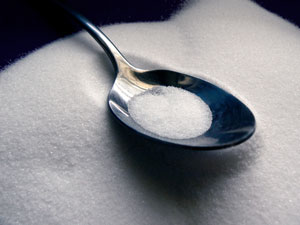 Soda gets most the blame for all the added sugar pumping through our children’s veins, but new data shows the blame should lie elsewhere.
Soda gets most the blame for all the added sugar pumping through our children’s veins, but new data shows the blame should lie elsewhere.
Children consume an average of 322 calories a day from added sugars. That’s a mind blowing 16% of their daily calories from extra sugars lurking in their diets, but according to the National Center for Health Statistics, 59% of that added sugar comes from food, not soda. But don’t keep you eye off the bubbly stuff just yet; soft drinks are still the largest single source of added sugars in our kid’s diets.
Added sugars come in the form of table sugar, brown sugar, high fructose corn syrup, maple syrup, honey, molasses and other caloric sweeteners in prepared and processed foods like cakes, candy, cookies, muffins, sodas, jams, jellys and ice cream. This study did not include natural sugars like those in fruit and 100% fruit juice.
A diet high in added sugars has been linked to obesity, high blood pressure and other risk factors for heart disease and stroke. The American Heart Association advises that most females consume no more than 100 calories, or about 6 teaspoons, a day from added sugars, and for males, no more than 150 calories, or about 9 teaspoons, per day.
If you are thinking of blaming the school vending machines or not being able to control what your children eat when they are away from the home, get this: 63% percent of these calories from added sugars are consumed at home. Here’s what you can do to cut back:
Cut back on prepackaged food. Packaged foods are pumped with sugars and sodium. Fake foods and chemicals aren’t particularly tasty, so these food like substances are filled with sugars to make them appetizing. Stick to whole foods that don’t come processed and packaged in a box.
Learn to love whole grain. Processed carbohydrates like white bread, white pasta and crackers and cookies spike blood sugar. Whole grains have no sugar added and keep blood sugar levels stable.
Go for the real stuff. If your kid just can’t quiet their sweet tooth, appease it with the sweetest treat of all: fruit. Not only are the sugars in fruit natural, so they don’t cause harmful health issues, they are full of other nutrients your child wouldn’t get from a snack full of added sugar.
Keep treats occasional. Let’s face it: kids need a cookie every once in a while, especially if you hope to teach them how to have a healthy relationship with food. Banning food of any kind isn’t only unrealistic, it can be detrimental to how you child (and you) look at food. Teach your children the all important lesson of moderation and they will be able to make healthful choices the rest of their lives.
